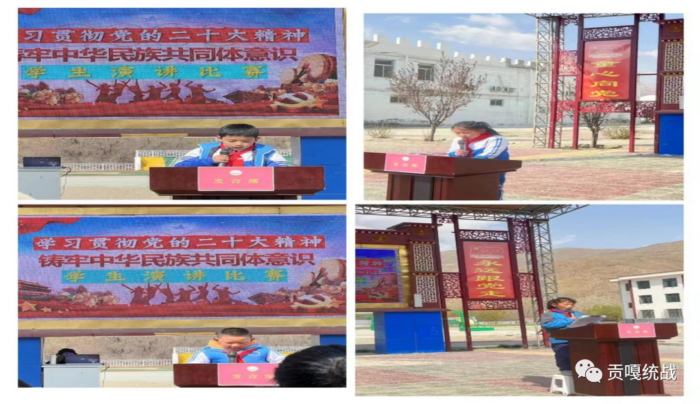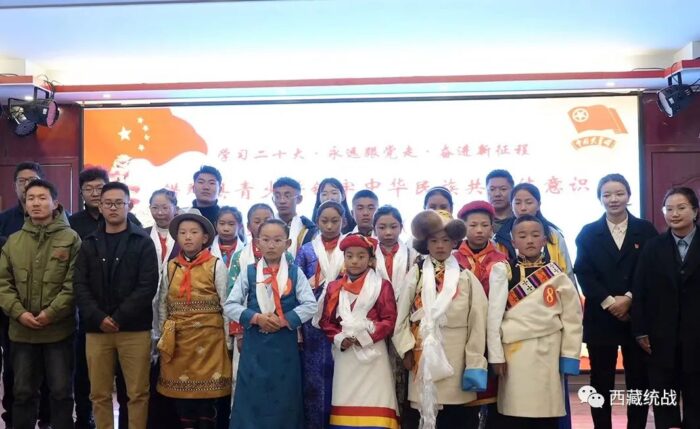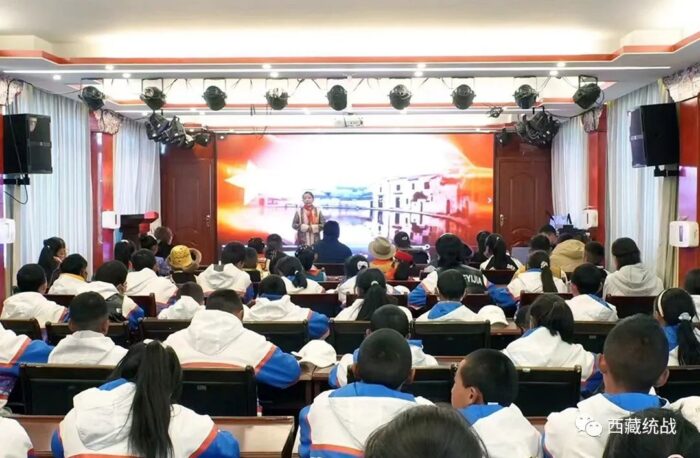Recent reports in Chinese state media indicate that authorities in Tibet are continuing their drive to indoctrinate Tibetan children at early ages and to enforce allegiance to the rule and the ideology of the Chinese Communist Party. The ongoing apparent attempts to weaken ties to Tibetan culture and to stifle dissent among young Tibetans fly in the face of concerns raised by independent international rights bodies, which have called for the protection of rights of Tibetan children, particularly in education.
While the reports in Chinese state media and on state-run websites indicate that Chinese authorities in Tibet use different instruments to indoctrinate Tibetan school children, the goal of the authorities appears to be largely twofold. On the one hand, Tibetan children are being conditioned at an early age to accept and follow CCP rule and ideology by means of repeated exposure to CCP narratives and slogans. On the other hand, a distorted view of Tibetan history is imparted to the children that imposes Chinese authorities’ denial of the Tibetan assertion that Tibet has not been a part of China. The apparent aim of the indoctrination drive is to establish that Chinese rule over Tibet is legitimate, instead of being a result of an illegal annexation by force.
China’s attempts to indoctrinate Tibetan children have led several international bodies to raise the alarm. In March, the United Nations Committee on Economic, Social and Cultural Rights called for an immediate abolishment of China’s coercive boarding school system in Tibet, expressing concern “about reports of the large-scale campaign to eradicate Tibetan culture and language.” In February, three independent United Nations experts warned that nearly 1 million Tibetan children have been separated from their families and sent to residential schools, where they are forced to learn in Mandarin Chinese in a curriculum built around Chinese culture. Previously, credible reports substantiated that up to 1 million Tibetan children are systematically alienated from their language and culture in compulsory boarding schools.
The International Campaign for Tibet calls on the Chinese government to end its attempts to indoctrinate Tibetan children and to respect their rights guaranteed by international law, such as the UN Covenant on Economic, Social and Cultural Rights and the UN Convention on the Rights of the Child, both of which China has ratified.
ICT President Tencho Gyatso said: “Tibetan children must not be subjected to and coerced into accepting the Communist Party’s ideology. Education must not be indoctrination. We are concerned about the well-being of those children, who are at a young age and are forced to accept CCP ideology to replace their Tibetan cultural identity.”
“Listen to the party, follow the party”
ICT’s concerns grew even higher this month as a result of several Chinese state media reports.
On May 9, the “Lhasa Evening News” reported that the Taktse (Chinese: Daze) District Propaganda Department organized a group tour for 200 Tibetan middle school students to the “Memorial Hall of the Emancipation of a Million Serfs in Tibet” in Lhasa, an exhibition hall that propagates the CCP’s view on the events in Lhasa of March 1959, when the Chinese military killed presumably tens of thousands of Tibetan protesters and forced the Dalai Lama into exile in India.
A state-run newspaper reports that a guide at the Memorial repeating propaganda slogans that liken gratitude and loyalty to the Communist Party to drinking water, while the instructor to the children declared that “Tibet has been an inseparable part of the sacred territory of the motherland since ancient times” and that “old Tibet was under the rule of feudal serfdom under the banner of church and state.” According to the report, the children were left with the impression that “without the CCP, there would be no new socialist Tibet, not to mention the happy life of Tibetan people today.”
The report explains that the next phase of propaganda activities aims to “guide the students to feel the party’s benevolence, listen to the party, follow the party, and strengthen the cultivation of moral, intellectual, physical and aesthetic development of socialist builders and successors.”
“National unity and family” – Primary school students to recite party ideology
In April, the United Work Front Department (UFWD), a department of the Central Committee of the Chinese Communist Party tasked with focusing on the management of potential opposition groups outside the Communist Party, reported that authorities organized a poetry recitation competition for Gongkar County middle school in Lhoka (Shannan) in the “Tibet Autonomous Region” (which spans about half of Tibet) on the theme of “National unity and family, building the Chinese dream together” on April 23.
Similarly, Namgyal Sholshang (Langjie Xuexiang) Primary School, also located in Gongkar, held a speech contest on April 19 with the theme of “Building a Consciousness of the Chinese Nation Community” to cultivate students’ loyalty to the Communist Party. The children were required to express their loyalty to China as part of their belief in a better future.
Images show children presumably at the age of 6 to 8 years old reciting from textbooks.

Primary school students at Namgyal Sholshang (Langjie Xuexiang) Primary School in Tibet recite Chinese Communist Party ideology. The banner on the upper and lower left read: “Study and implement the Spirit of the 20th Party Congress of Chinese Communist Party” and “Constructing the Consciousness of the Chinese National Community.”
“Patriotic education” tours
On May 9, the Tibetan service of the state-run “China National Radio” reported that 32 Tibetan middle school students from Dhingri (Tingri) County in Shigatse (Rikaze) were taken for a weeklong “patriotic education” tour to Beijing, jointly organized by the Civil Affairs Department of the so-called Tibet Autonomous Region and the “Charity Federation of the Tibet Autonomous Region.”
The students were present at a flag-raising ceremony at Tiananmen Square and visited the National Museum, the China Monetary Museum and Beijing Aeronautics University, as well as the old Palace Museum and other places.
A series of “patriotic educational activities” similar to the Dhingri County middle schoolers’ visit to Beijing are also planned for Tibetan children from other counties in the TAR, the report indicates.
“Express love for the Party and the Motherland”
On May 5, the United Front Work Department reported that the Tsona (Cuona), Tibet Autonomous Region County Committee of the Communist Youth League and the County Comprehensive Cultural Service Center organized a speech competition event for 33 contestants from a Tibetan youth group.
The event, which representatives of the Party Propaganda Department, the United Front Work Department, the Youth League Committee, the Women’s Federation, the Education Bureau and the Cultural Bureau attended as judges, tested the children on their understanding of the CCP and its policies with an emphasis on “building a solid awareness of the Chinese nation community.”
The report, in emphatic language, highlights “emotional speeches” given with “vivid language.” A group photo shows Tibetan students the ages of approximately 8 to 16.


Students attend a “speech competition” in Tsona County, Tibet Autonomous Region.
Qinghai authorities: An educational system “firmly oriented towards socialism”
In a joint meeting held between the Ministry of Education and Qinghai Province on April 13 to discuss educational reforms and development plans, the Minister of Education Huai Jinpeng expressed “his willingness to enhance cooperation” with the provincial government to jointly implement the central government’s decisions on educational reforms, which include prioritizing “moral education to ensure that the educational system is safe, stable, and firmly oriented towards socialism.”
Qinghai has some of the most populous Tibetan autonomous prefectures outside the TAR, making up 21.8% of the total Tibetan population in Tibet, according to the Sixth National Population Census (2010).
Tibetan cultural and language education has suffered major setbacks in the last few years in the province, especially with the closure of reputed Tibetan private schools and the imposition of a state-compiled curriculum and Chinese medium education following years of resistance from the Tibetan people.
On November 29, 2022, the state-run “Tibetan.net”, a Tibetan language culture and news website sponsored by the Party’s media arm, reported that all junior middle schools in Malho (Huangnan) Tibetan Autonomous Prefecture, Qinghai province, began imparting Party ideological and political work education in keeping with the 20th Party Congress agenda “to establish socialism with Chinese characteristics in the new era.” The report says furthering party political work and imparting political ideology and moral education is to be treated as the number one political responsibility.
National level
At the national level, the Second Plenary Meeting of the 2023 National Educational Work Conference in January 2023 noted that efforts will be made to increase “political awareness across the educational system” to better serve national goals and promote social and economic development.

